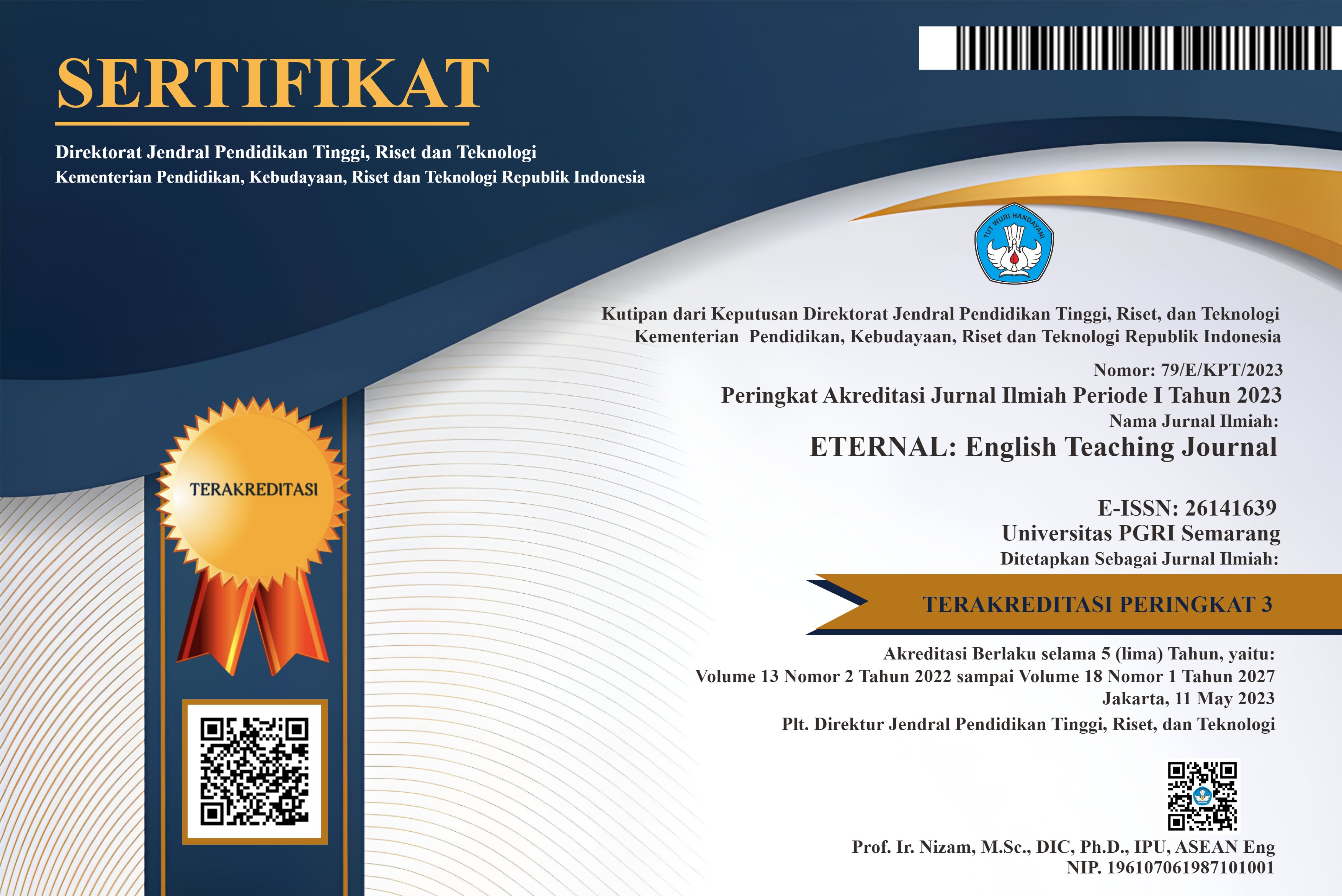Emotional Regulation Ability on Test Results: Factors Affecting Motivation and Learning Achievement
DOI:
https://doi.org/10.26877/eternal.v15i1.343Keywords:
academic emotion regulation, test results, motivation, achievementAbstract
The ability to regulate emotions in the acceptance of test results can impact both the increase and decrease of motivation. Unfortunately, there has not been much research explaining this phenomenon. Therefore, this study aimed to examine the influence of emotions on the acceptance of test results on students' learning motivation. This research used an ex post facto approach with a cause-and-effect correlation design. The population consisted of 300 students at SMPN 2 Kuta Selatan. Using purposive sampling, 30 students were involved as research samples. The research instrument consisted of 21 statements from the DAS questionnaire about test results, 20 statements about student motivation, and a formative test. Data were analyzed descriptively, using correlation statistics and paired sample t-tests. The research results showed that there was a significant relationship between the ability to manage depression, anxiety, and stress in the acceptance of test results. In addition, students with better emotional management skills tended to have positive motivation if their test results were disappointing. Meanwhile, students with low emotional abilities also had low motivation. For these affecting factors on students’ achievements, this study suggests a more holistic pedagogical approach and intervention as essential components in efforts to improve their learning achievement
References
Adesola, S. A., & Li, Y. (2018). The relationship between self-regulation, self-efficacy, test anxiety and motivation. International Journal of Information and Education Technology, 8(10), 759–763. https://doi.org/10.18178/ijiet.2018.8.10.1135
Anderson, L. W., & Krathwohl, D. R. (2001). A taxonomy for learning, teaching, and assessing: A revision of Bloom’s taxonomy of educational objectives: complete edition. Addison Wesley Longman, Inc.
Brosch, T., Pourtois, G., & Sander, D. (2010). The perception and categorisation of emotional stimuli: A review. Cognition and Emotion, 24(3), 377–400. https://doi.org/10.1080/02699930902975754
Christie, A., Jordan, P., Troth, A., & Lawrence, S. (2007). Testing the links between emotional intelligence and motivation. Journal of Management & Organization, 13(3), 212–226. https://doi.org/10.5172/jmo.2007.13.3.212
Cresswell, J., Schwantner, U., & Waters, C. (2015). A review of international large-scale assessments in education: Assessing component skills and collecting contextual data.
Daniela, P. (2015). The Relationship Between Self-Regulation, Motivation And Performance At Secondary School Students. Procedia - Social and Behavioral Sciences, 191, 2549–2553. https://doi.org/10.1016/j.sbspro.2015.04.410
Dweck, C. S. (1986). Motivational processes affecting learning. American Psychologist, 41(10), 1040. https://doi.org/10.1037/0003-066X.41.10.1040
Epstein, A. S., Schweinhart, L. J., DeBruin-Parecki, A., & Robin, K. B. (2004). Preschool assessment: A guide to developing a balanced approach. Preschool Policy Matters, 7, 1–2.
Fontaine, J. R. J., Scherer, K. R., Roesch, E. B., & Ellsworth, P. C. (2007). The World of Emotions is not Two-Dimensional. Psychological Science, 18(12), 1050–1057. https://doi.org/10.1111/j.1467-9280.2007.02024.x
Fried, L., & Chapman, E. (2012). An investigation into the capacity of student motivation and emotion regulation strategies to predict engagement and resilience in the middle school classroom. The Australian Educational Researcher, 39(3), 295–311. https://doi.org/10.1007/s13384-011-0049-1
Goleman, D. (2001). An EI-based theory of performance. The Emotionally Intelligent Workplace: How to Select for, Measure, and Improve Emotional Intelligence in Individuals, Groups, and Organizations, 1(1), 27–44.
Graziano, P. A., Reavis, R. D., Keane, S. P., & Calkins, S. D. (2007). The role of emotion regulation in children’s early academic success. Journal of School Psychology, 45(1), 3–19. https://doi.org/10.1016/j.jsp.2006.09.002
Guskey, T. R. (2013). Defining student achievement. International Guide to Student Achievement, 3–6.
Hattie, J. (2012). Visible learning for teachers: Maximizing impact on learning. Routledge.
Järvenoja, H., & Järvelä, S. (2009). Emotion control in collaborative learning situations: Do students regulate emotions evoked by social challenges. British Journal of Educational Psychology, 79(3), 463–481. https://doi.org/10.1348/000709909X402811
Lovibond, P. F., & Lovibond, S. H. (1995). The structure of negative emotional states: Comparison of the Depression Anxiety Stress Scales (DASS) with the Beck Depression and Anxiety Inventories. Behaviour Research and Therapy, 33(3), 335–343. https://doi.org/10.1016/0005-7967(94)00075-u.
Marzano, R. J. (2003). What works in schools: Translating research into action. ASCD.
Mayer, J. D., & Salovey, P. (1995). Emotional intelligence and the construction and regulation of feelings. Applied and Preventive Psychology, 4(3), 197–208.
Pallant, J. (2020). SPSS survival manual: A step by step guide to data analysis using IBM SPSS. McGraw-hill education (UK).
Pekrun, R. (2006). The Control-Value Theory of Achievement Emotions: Assumptions, Corollaries, and Implications for Educational Research and Practice. Educational Psychology Review, 18(4), 315–341. https://doi.org/10.1007/s10648-006-9029-9
Pekrun, R., Goetz, T., Titz, W., & Perry, R. P. (2002). Academic emotions in students’ self-regulated learning and achievement: A program of qualitative and quantitative research. Educational Psychologist, 37(2), 91–105. https://doi.org/10.1207/S15326985EP3702_4
Prastiyo, W. A., & Muzzamil, F. (2023). Emotional Intelligence and Self-Control at Spread of Hoax News on Student Gadget Users. Linguanusa, 1(2), 1–12.
Singh, P., & Singh, N. (2013). Difficulties in emotion regulation: A barrier to academic motivation and performance. Journal of the Indian Academy of Applied Psychology, 39(2), 289.
Tan, J., Mao, J., Jiang, Y., & Gao, M. (2021). The influence of academic emotions on learning effects: A systematic review. International Journal of Environmental Research and Public Health, 18(18), 9678. https://doi.org/10.3390/ijerph18189678







